8 start with L start with L
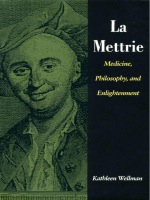
Wellman’s study presents La Mettrie as an advocate of progressive medical theory and practice who consistently applied his medical concerns to the reform of philosophy, morals, and society. By examining his training with the Dutch physician Hermann Boerhaave, his satires lampooning the ignorance and venality of the medical profession, and his medical treatises on subjects ranging from vertigo to veneral disease, Wellman illuminates the medical roots of La Mettrie’s philosophy. She shows how medicine encouraged La Mettrie to undertake an impiricist critique of the philosophical tradition and provided the foundation for a medical materialism that both shaped his understanding of the possibilities of moral and social reform and led him to espouse the cause of the philosophers.
Elucidating the medical view of nature, human beings, and society that the Enlightenment and La Mettrie in particular bequethed to the modern world, La Mettrie makes an important contribution to our understanding of both that period and our own.

Although Leibniz is universally regarded as the greatest German philosopher before Kant, his work as a political and moral philosopher is almost entirely neglected in the English-speaking world, where he is seen chiefly as a metaphysician, mathematical logician, and co-discoverer of calculus. Yet Leibniz' doctoral degree was in law and jurisprudence, and he served throughout his life as a judge and a diplomat; he was a valued political--legal adviser to Czar Peter the Great, to the King of Prussia in Berlin, and to the Holy Roman Emperor in Vienna. Patrick Riley recovers this crucial part of Leibniz' thought and activity.
For the first time--as we celebrate the 350th anniversary of Leibniz' birth--his political, moral, and legal thought are extensively discussed here in English. The text includes fragments of his work that have never before been translated. Riley shows that "justice as wise charity" has at least as much claim to be taken seriously as the familiar contractarian ideas of Hobbes and Locke. Since Leibniz was the greatest Platonist of early modernity, Riley argues, his version of Platonic idealism serves as the bridge from Plato himself to the greatest modern "critical" idealist, Kant. With Leibniz' Universal Jurisprudence we now have a fuller picture of one of the greatest general thinkers of the seventeenth century.
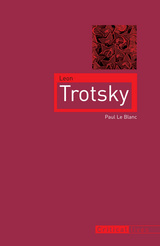
In Leon Trotsky, Paul Le Blanc delves deep into Trotsky’s life and relationships to reveal and make sense of his complex character and decisive actions. Interweaving dramatic historical events with examinations of Trotsky’s multi-faceted personality, he offers incisive views of the key facets of Trotsky’s life: his involvement with Soviet bureaucracy, the Spanish Civil War, and the rise of Hitler in the years before World War II. Illuminating Trotsky’s personal and political struggles and achievements, this balanced portrait will be invaluable to history students or anyone interested in the extraordinary lives that made up the twentieth century.

Of the distinguished Lemnian family of Philostrati, Flavius Philostratus 'the Athenian', ca. 170205 CE, was a Greek sophist who studied at Athens and later lived in Rome. He was author of the admirable Life of Apollonius of Tyana (Loeb nos. 16 and 17) and of Lives of the Sophists, a treasury of information about notable sophists. Philostratus's sketches of sophists in action yield a fascinating picture of the predominant influence of Sophistic in the educational, social, and political life of the Empire in the second and third centuries.
The Greek sophist and historian Eunapius was born at Sardis in 347 CE, but went to Athens to study and lived much of his life there teaching rhetoric and possibly medicine. He was initiated into the mysteries and was hostile to Christians. His Lives of Philosophers and Sophists (mainly contemporary with himself) is our only source for knowledge of Neo-Platonism in the latter part of the fourth century.
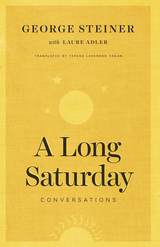
In a stimulating series of conversations, Steiner and journalist Laure Adler discuss a range of topics, including Steiner’s boyhood in Vienna and Paris, his education at the University of Chicago and Harvard, and his early years in academia. Books are a touchstone throughout, but Steiner and Adler’s conversations also range over music, chess, psychoanalysis, the place of Israel in Jewish life, and beyond. Blending thoughts on subjects of broad interest in the humanities—the issue of honoring Richard Wagner and Martin Heidegger in spite of their politics, or Virginia Woolf’s awareness of the novel as a multivocal form, for example—with personal reflections on life and family, Steiner demonstrates why he is considered one of today’s greatest minds. Revealing and exhilarating, A Long Saturday invites readers to pull up a chair and listen in on a conversation with a master.
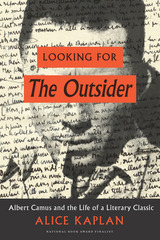
How did a young man in his twenties who had never written a novel turn out a masterpiece that still grips readers more than seventy years later? With Looking for “The Outsider”, Alice Kaplan tells that story. In the process, she reveals Camus’s achievement to have been even more impressive—and more unlikely—than even his most devoted readers knew.
Born in poverty in colonial Algeria, Camus started out as a journalist covering the criminal courts. The murder trials he attended, Kaplan shows, would be a major influence on the development and themes of The Outsider. She follows Camus to France, and, making deft use of his diaries and letters, re-creates his lonely struggle with the novel in Montmartre, where he finally hit upon the unforgettable first-person voice that enabled him to break through and complete The Outsider.
Even then, the book’s publication was far from certain. France was straining under German occupation, Camus’s closest mentor was unsure of the book’s merit, and Camus himself was suffering from near-fatal tuberculosis. Yet the book did appear, thanks in part to a resourceful publisher, Gaston Gallimard, who was undeterred by paper shortages and Nazi censorship.
The initial critical reception of The Outsider was mixed, and it wasn’t until after liberation that The Outsider began its meteoric rise. As France and the rest of the world began to move out of the shadow of war, Kaplan shows, Camus’s book— with the help of an aggressive marketing campaign by Knopf for their 1946 publication of the first English translation—became a critical and commercial success, and Camus found himself one of the most famous writers in the world. Suddenly, his seemingly modest tale of alienation was being seen for what it really was: a powerful parable of the absurd, an existentialist masterpiece.
Few books inspire devotion and excitement the way The Outsider does. And it couldn’t have a better biographer than Alice Kaplan, whose books about twentieth-century French culture and history have won her legions of fans. No reader of Camus will want to miss this brilliant exploration.
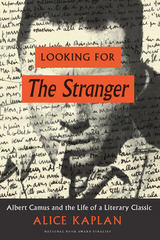
How did a young man in his twenties who had never written a novel turn out a masterpiece that still grips readers more than seventy years later? With Looking for “The Stranger”, Alice Kaplan tells that story. In the process, she reveals Camus’s achievement to have been even more impressive—and more unlikely—than even his most devoted readers knew.
Born in poverty in colonial Algeria, Camus started out as a journalist covering the criminal courts. The murder trials he attended, Kaplan shows, would be a major influence on the development and themes of The Stranger. She follows Camus to France, and, making deft use of his diaries and letters, re-creates his lonely struggle with the novel in Montmartre, where he finally hit upon the unforgettable first-person voice that enabled him to break through and complete The Stranger.
Even then, the book’s publication was far from certain. France was straining under German occupation, Camus’s closest mentor was unsure of the book’s merit, and Camus himself was suffering from near-fatal tuberculosis. Yet the book did appear, thanks in part to a resourceful publisher, Gaston Gallimard, who was undeterred by paper shortages and Nazi censorship.
The initial critical reception of The Stranger was mixed, and it wasn’t until after liberation that The Stranger began its meteoric rise. As France and the rest of the world began to move out of the shadow of war, Kaplan shows, Camus’s book— with the help of an aggressive marketing campaign by Knopf for their 1946 publication of the first English translation—became a critical and commercial success, and Camus found himself one of the most famous writers in the world. Suddenly, his seemingly modest tale of alienation was being seen for what it really was: a powerful parable of the absurd, an existentialist masterpiece.
Few books inspire devotion and excitement the way The Stranger does. And it couldn’t have a better biographer than Alice Kaplan, whose books about twentieth-century French culture and history have won her legions of fans. No reader of Camus will want to miss this brilliant exploration.
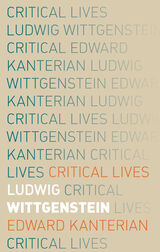
Ludwig Wittgenstein is generally considered as the greatest philosopher since Immanuel Kant, and his personal life, work, and his historical moment intertwined in a fascinating, complex web. Noted scholar Edward Kanterian explores these intersections in Ludwig Wittgenstein, the newest title in the acclaimed Critical Lives series.
Wittgenstein’s works—from Tractatus Logico-Philosophicus to the posthumously published Philosophical Investigations—are notoriously dense, and Kanterian carefully distills them here, proposing thought-provoking new interpretations. Yet the philosopher’s passions were not solely confined to theoretical musings, and the book explores Wittgenstein’s immersion in art and music and his social position as a member of the sophisticated Viennese upper class at the turn of the century. His personal and professional relationships also offer insights into his thoughts, as he was friends with the greatest thinkers of the twentieth century, including John Maynard Keynes, George Edward Moore, Bertrand Russell, and Gilbert Royle. The philosopher was also deeply tormented by ethical and religious questions, and his internal turmoil, Kanterian argues, gives us a deeper understanding of the important conflicts and tensions of his age. Ultimately, the author contends, Wittgenstein’s life reveals insights into the ethical quandaries of our own time.
A readable and concise account, Ludwig Wittgenstein is an informative, accessible introduction to the one of the greatest thinkers of our age.
READERS
Browse our collection.
PUBLISHERS
See BiblioVault's publisher services.
STUDENT SERVICES
Files for college accessibility offices.
UChicago Accessibility Resources
home | accessibility | search | about | contact us
BiblioVault ® 2001 - 2024
The University of Chicago Press









